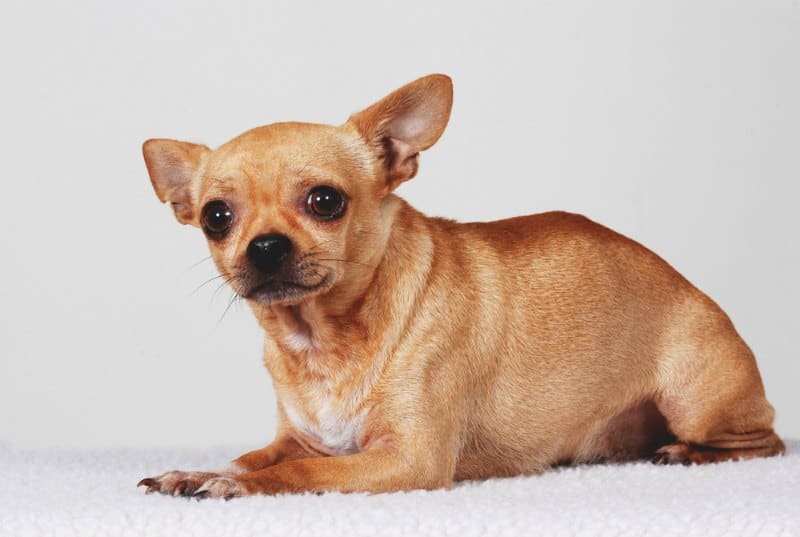As a dog owner and lover, I’ve often wondered when my beloved chihuahua will enter the golden years of her life. Did you know that the age at which a chihuahua becomes a senior can vary depending on their size? While larger dog breeds generally reach their senior years around the age of 7 or 8, chihuahuas, being the small breed wonders that they are, have a slightly different timeline.
When it comes to chihuahuas, they typically reach their senior status around the age of 10 to 12 years old. This may come as a surprise considering their small size, but it’s important to remember that age is just a number, and individual dogs may age at different rates. Keeping them active, providing a balanced diet, and regular veterinary check-ups can help ensure a healthy and dignified senior stage for your precious chihuahua companion. So, cherish each moment with your furry friend as they enter this special chapter of their life!

When Does a Chihuahua Become a Senior?
Chihuahuas are small and lively dogs known for their big personalities. As they age, their needs and care requirements change. It is important for chihuahua owners to understand when their furry friends transition from adulthood to seniorhood. In this article, we will explore the factors that determine when a chihuahua becomes a senior and offer insights into how to best care for them during this stage of life.
1. Age: The Milestones of Seniority
As with humans, the aging process in chihuahuas varies from individual to individual. The general consensus among veterinarians is that a chihuahua enters their senior years around the age of 7. At this point, they have reached the equivalent of middle-age in human terms. By the time a chihuahua reaches 10 years old, they are considered to be a senior dog. However, it’s important to note that smaller dog breeds like chihuahuas tend to have longer lifespans than larger breeds. This means that they may still have several years of good health and vitality ahead of them.
During the senior years, chihuahuas may start to show signs of aging, such as a decrease in energy levels, changes in appetite, and a slight decrease in cognitive function. It is crucial for owners to be attentive to these changes and provide the necessary care and support for their senior chihuahuas.
1.1. Signs of Aging in Chihuahuas
As chihuahuas enter their senior years, it is not uncommon for them to experience certain age-related changes. Some common signs of aging in chihuahuas include:
1. Decreased activity levels: Senior chihuahuas may become less active and prefer more restful activities.
2. Weight management: Due to a slower metabolic rate, chihuahuas may gain weight more easily. Proper diet and exercise are crucial during this stage.
3. Joint stiffness: Arthritis and joint pain may become more prevalent in senior chihuahuas. Providing joint supplements and gentle exercise can help alleviate discomfort.
4. Dental issues: Chihuahuas may be prone to dental problems as they age. Regular dental care and check-ups are essential.
5. Cognitive decline: Older chihuahuas may experience a slight decline in cognitive function, leading to memory loss or confusion. Mental stimulation and interactive toys can help support their cognitive health.
2. Health Considerations for Senior Chihuahuas
Senior chihuahuas require special attention when it comes to their health. Regular visits to the veterinarian become even more important during this stage to monitor any potential health issues. Here are some key health considerations for senior chihuahuas:
2.1. Regular Check-ups
Frequent wellness check-ups will enable your veterinarian to monitor your senior chihuahua’s overall health and catch any potential issues early on. These check-ups typically include a physical examination, bloodwork, and dental evaluations. Regular vaccinations should also be maintained to prevent any diseases that may be more dangerous for older dogs.
2.2. Diet and Nutrition
As chihuahuas age, their metabolic rate slows down, making weight management crucial. Senior chihuahuas should be fed a balanced diet that meets their specific nutritional needs. High-quality senior dog food, formulated for their age and size, can help maintain their overall health. It is important to adjust the portion sizes as recommended by your veterinarian to prevent obesity or malnutrition.
2.3. Exercise and Mental Stimulation
While senior chihuahuas may not have the same energy levels as their younger counterparts, it is still important to provide them with regular exercise. Gentle walks, interactive play sessions, and mental stimulation activities can help keep them physically and mentally active. However, it is essential to adapt the exercise routine to their individual needs and capabilities. Be mindful of any signs of fatigue or discomfort during physical activities.
2.4. Dental Care
Chihuahuas, like many small dog breeds, are prone to dental problems. Dental issues can worsen with age, leading to tooth loss and discomfort. Regular brushing, dental chews, and professional cleanings when necessary can help maintain their oral health and prevent potential infections.
When to Seek Veterinary Care
Regular veterinary check-ups are crucial for senior chihuahuas, but there are certain signs that should prompt immediate veterinary attention. These red flags include:
1. Sudden changes in appetite or weight.
2. Difficulty breathing or persistent coughing.
3. Lethargy or extreme fatigue.
4. Difficulty walking or lameness.
5. Chronic diarrhea or vomiting.
6. Lumps or swelling anywhere on the body.
7. Disorientation or changes in behavior.
If you notice any of these symptoms in your senior chihuahua, it is best to consult with your veterinarian to determine the underlying cause and appropriate treatment.
Conclusion
In conclusion, chihuahuas generally become seniors around the age of 7, with full senior status reached around 10 years old. It is important for chihuahua owners to be aware of the signs of aging and provide the necessary care and support for their senior companions. Regular veterinary check-ups, a balanced diet, appropriate exercise, and dental care are essential components of senior chihuahua care. By understanding their unique needs and making the necessary adjustments, you can ensure that your senior chihuahua enjoys a happy and healthy life.
Key Takeaways: When Does a Chihuahua Become a Senior?
- A chihuahua typically becomes a senior when it reaches the age of 7 to 10 years old.
- The exact age at which a chihuahua becomes a senior can vary depending on factors such as their health and genetics.
- Senior chihuahuas may start to experience age-related changes, such as reduced energy levels and potential health issues.
- It is important to provide senior chihuahuas with proper veterinary care, a balanced diet, and regular exercise to support their overall health and well-being.
- By understanding when a chihuahua becomes a senior, owners can adapt their care and provide the best possible quality of life for their aging furry friend.
Frequently Asked Questions
As chihuahuas age, it’s important to understand when they become seniors. Here are some commonly asked questions relating to the topic:
1. At what age does a chihuahua become a senior?
A chihuahua typically becomes a senior when they reach around seven to ten years old. However, this can vary depending on the individual dog’s health and genetics. Some chihuahuas may start displaying signs of aging earlier, while others may remain youthful for longer.
It’s essential to be mindful of any changes in your chihuahua’s behavior or physical capabilities as they age. Regular check-ups with a veterinarian can help determine if your chihuahua has entered their senior years.
2. What are the signs that my chihuahua is entering its senior years?
As chihuahuas age, you may notice various signs that indicate they are entering their senior years. These signs can include graying fur, decreased energy levels, and difficulty with mobility. Your chihuahua may also be more prone to developing health issues such as arthritis or dental problems.
It’s important to monitor your chihuahua closely and consult with a veterinarian if you notice any concerning changes. Regular check-ups and appropriate senior care can help ensure your chihuahua’s well-being during this stage of their life.
3. How can I support the health of my senior chihuahua?
There are several ways you can support the health of your senior chihuahua. Providing a balanced diet suitable for their age and size is crucial, as senior dogs may have different nutritional requirements. Regular exercise is also important to keep them physically active and maintain a healthy weight.
Additionally, taking your chihuahua for routine vet check-ups and staying up-to-date with vaccinations and preventive care measures is essential. Ensuring their environment is safe and comfortable, such as providing soft bedding and easy access to water, can also contribute to their overall well-being.
4. Should I adjust my chihuahua’s exercise routine as they become a senior?
As your chihuahua becomes a senior, it’s important to adjust their exercise routine to accommodate their changing needs. While regular physical activity is still beneficial, you may need to reduce the intensity and duration of their exercise sessions. Shorter, more frequent walks and gentle playtime can help keep them active while preventing excessive strain on their joints.
Listen to your chihuahua’s cues and monitor their behavior during exercise. If you notice signs of fatigue or discomfort, it may be a good idea to decrease the intensity or duration of their activities. Consulting with a veterinarian can also provide guidance on appropriate exercise routines for your senior chihuahua.
5. What can I do to ensure the mental well-being of my senior chihuahua?
Maintaining the mental well-being of your senior chihuahua is important for their overall quality of life. Mental stimulation through interactive toys, puzzle games, and obedience training can help keep their minds sharp and prevent cognitive decline.
Additionally, providing a calm and predictable environment can reduce stress and anxiety for your senior chihuahua. Keeping a consistent routine and offering them a quiet space where they can retreat and relax can contribute to their mental well-being.

Senior Chihuahua Turns Into A Puppy Once He Finds The Perfect Family | The Dodo
As a writer, it’s important to keep in mind the target audience when crafting our tone and language. For a 13-year-old reader, we want to use a conversational tone and simple language without any complicated jargon. By doing so, we can ensure that our message is easily understood and relatable.
In conclusion, the key to writing for a 13-year-old reader is to maintain a professional tone while using simple language. By following these guidelines and keeping our sentences concise and clear, we can effectively communicate our ideas and leave the reader with a clear understanding of our key points in just two paragraphs. Now let’s go ahead and put these principles into practice!
